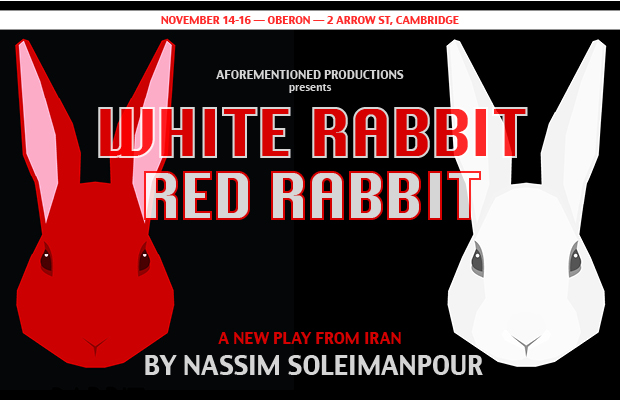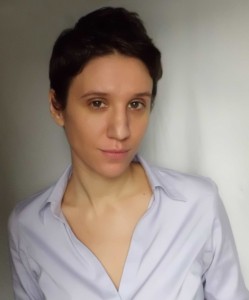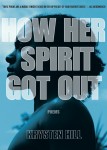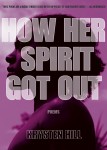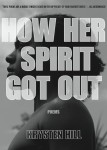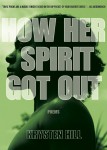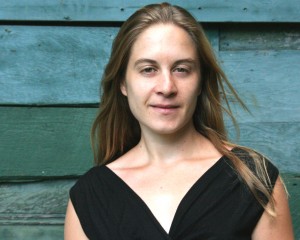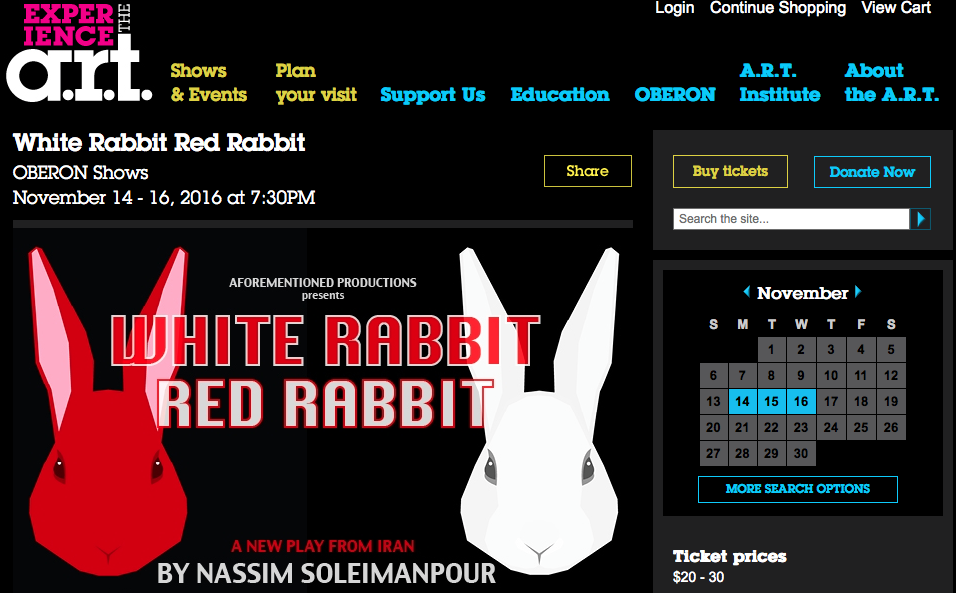
Just four days left until our production of White Rabbit Red Rabbit comes to OBERON! The show has been described as “a thoughtful, playful response to oppression” in The Guardian, and we’re taking that as a necessary reaction to the results of our recent election.
We’ve got one more cast member to catch up with: AP cofounder, Randolph Pfaff.
Since Randolph will be our stage manager and Emcee, the questions we asked the other cast members didn’t exactly apply, so Carissa wrote new questions for him:
You hold the key to this production—as stage manager, you hold the script. What does it mean to you to wield that sort of power?
I think the real power lies in the unknown for this production. There’s this energy at the intersection of the script and the experience, playfulness, and flexibility of the actors. That said, there’s great excitement in creating this surprise for the three actors. It’s like a really good gift you’ve found for someone’s birthday and the real joy isn’t in giving the gift but in watching them receive it. (Editor’s note: How fitting that there are gifts behind Randolph in his photo.)
When we started this project, I approached you to perform and, initially, you said yes. Then you changed your mind (and broke my heart). Will you talk a bit about those choices (and how you’ll make it up to me)?
Well, I’m clearly more suited to heartbreaker roles and since I couldn’t guarantee what sort of leading man I’d be in this show, I had to decline.
In all seriousness, there were two reservations that led me to decline: 1. I don’t perform often, though I read my work now and then. Because the only real preparation that’s possible for White Rabbit Red Rabbit is to be comfortable on stage—physically, emotionally, and creatively—I didn’t feel like I’d be able to give it the performance it deserves, and 2. In the current sociopolitical environment of our country, I couldn’t see filling one night of a three-night run with a white male performer. There are so many actors who can bring cultural and experiential context to this show that I can’t. I don’t think putting a white guy on stage by himself in Harvard Square and having him talk for 90 minutes is doing much to shift perspectives and open people up to new ideas and conversations, which are what we need now more than ever. I’m happy to listen and learn and participate rather than driving the conversation.
To answer the second part of your question, I suppose, in keeping with the spirit of the show, I’ll have to surprise you with something to make it up to you.
Good stage managers, like good editors, work invisibly. They do their magic and step back, and the reader/audience is none the wiser. But in this show specifically, we need your guidance. You’re the only one who knows, right now, what this show is going to be like. How are you approaching that responsibility? (And will you break up with us if we get too needy?)
I’d be a hypocrite to judge the too-needy among us, so I’m going to do whatever I can to ensure that all three of you can get up on stage and just go for it. I think the best thing I can do is to give each of you the confidence that you won’t need to rely on anyone or anything other than yourselves once you’re on stage.
Even though “Productions” is half of Aforementioned’s name, only a handful of people know we started out as a theatre company. How do you feel about this return to staged work?
I’m excited that we’re getting back to producing theatre by doing something really challenging. It’s an art form that has the power to entertain, engage, and educate without being overtly didactic. I think most audience members have a fluid relationship with theatre and are far more willing to take a risk by immersing themselves in a new experience. In return, playwrights and performers are able to break rules and blur boundaries because the audience has consented to a kind of openness and acceptance they might not be willing to give in other contexts.
If you were to talk up White Rabbit Red Rabbit to people on the street—without saying top secret, once in a lifetime, or experimental—what would you tell prospective audience members about the production?
I’d tell them that we’ve been getting too many bad surprises of late and that this show is the opposite of that. I’d say it’s a reminder that there are spaces in which we can go out on a limb without fear that the branch will break beneath us.
Last question: Part of the fun of performing and producing this show is the risk: the whole thing runs on potential and we won’t know what’s happening until we’re in it. As a writer and a visual artist, how does the unknown figure in your work?
This might be the perfect show for me to be a part of because I’m totally infatuated by the ways in which we approach the unknown. In my work, I’m most interested in the process of teasing out what I can’t define or articulate rather than defining and articulating it. We spend our whole lives trying to figure out who we are and how we relate to other people and how we fit into the larger world, but it’s the attempt itself that shapes who we become. We’re defined by the practice, not the conclusion, and the practice is an ongoing, loving embrace of the unknown.
Read about the rest of the cast at the WRRR page, and to reserve your seats for the show, head over to OBERON!
